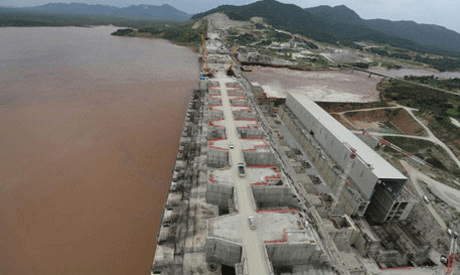
A file photo of Grand Ethiopian Renaissance Dam in Ethiopia (Photo: Reuters)
The Nile for Peace Initiative called on Sunday for the need to reach a legally-binding agreement that preserves the water rights of Egypt, Sudan, and Ethiopia in the Nile over the Grand Ethiopian Renaissance Dam’s (GERD) filing and operation policies.
In a press conference held in Cairo to introduce the initiative and its NGOs members to the Egyptian audience, the Nile for Peace Initiative shared its activities in the past two months since its launch in April in the Ugandan capital of Kampala till now, as well as its future plan to help in solving the GERD’s deadlock.
15 members of the initiative from various African countries have participated in the conference organised by Cairo-based Maat for Peace, Development, and Human Rights, through online recorded speeches.
Kofi Kankam, chair of the Major NGO Group in Africa and vice-chair of the African Mechanism of Major Governmental Organisations, said that the initiative held a number of meetings and high-level visits, topped by meetings with the Egyptian Minister of Irrigation and members of the House of Representatives, as well as a number of African embassies in Egypt led by the Ethiopian ambassador in Cairo, to present alternative solutions to the initiative and the African views that recommend postponing the second filling of the GERD until a legally-binding agreement guaranteeing the rights of the three peoples is reached between the three countries.
As to the initiative’s future steps, Kankam, the head of the initiative's delegation to Egypt, declared that a number of meetings will be held with decision-makers and actors in the African Union, the European Union, the United States of America, and some United Nations bodies, as a mobilisation of international solidarity to introduce them to the initiative and hear their point of view, and to stress the need for the development of a legally-binding framework that preserves the rights of all states.
Ayman Okeil — president of Maat for Peace, Development, and Human Rights — stated that the initiative is not aimed at impeding the development process in Ethiopia, as long as this development is not detrimental to the rights of the peoples of Egypt and Sudan.
Okeil added that Ethiopia, for its part, must stop the second filling of the GERD as a demonstration of goodwill towards the peoples of Egypt and Sudan. While Egypt, Sudan, and the international community must support Ethiopia in its developmental process, especially energy projects, and compensate it in case of any damage caused by the delay.
Hanan Muddathir — founder, representative, and president of the Environmental Initiative Organisation for Sustainable Development in Sudan — addressed the shortcomings in the negotiation process over the past ten years, especially the lack of involvement of civil society organisations in the issue.
Muddathir encouraged the three countries to return to the negotiating table as soon as possible and to seek solutions in the framework of international treaties and covenants, stressing that peoples' lives are not negotiable.
Short link: